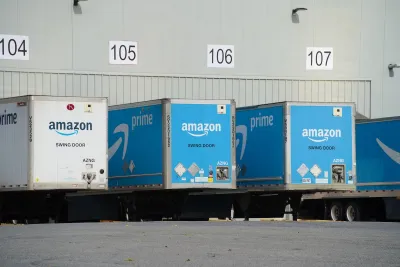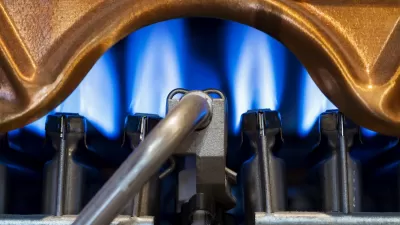The rise of ‘last-mile’ e-commerce warehouses — and their attendant truck traffic and air pollution — is disproportionately impacting the most historically disadvantaged parts of the city.

Air pollution from delivery trucks is impacting the health of New Yorkers, with an estimated 2,000 excess deaths per year attributed to long-term exposure to fine particulate matter, according to city data.
As Lauren Dalban reports in Inside Climate News, “The poorest neighborhoods often suffer the most in this equation—the PM2.5 levels from traffic are often higher in high-poverty neighborhoods, as well as the number of hospitalizations related to this pollutant.”
Dalban explains that the “last-mile warehouses” built for the distribution of e-commerce goods, which add to traffic and air pollution in surrounding areas, are often located in the poorest neighborhoods. Such warehouses can be built without a permit or environmental review in eight “commercial or manufacturing districts” around the city — many of which coincide with “environmental justice areas—places that have experienced a disproportionate amount of negative impacts from environmental issues due to historical disinvestment and social inequities.”
As part of an effort to redesign its trucking routes, New York City has launched a Commercial Cargo Bicycle Pilot Program and MicroHub program to encourage the use of smaller, low- or zero-emissions vehicles such as vans and cargo bikes for last-mile deliveries. According to Zach Miller of the Trucking Association of New York, “I think 80 percent of deliveries are happening to people’s homes right now in New York City, and that’s not what the truck route network was designed to do, so it is long past time to have this network be redesigned.”
FULL STORY: The Online Shopping Boom Comes at a Price—and Some New Yorkers Pay More Than Their Fair Share

Alabama: Trump Terminates Settlements for Black Communities Harmed By Raw Sewage
Trump deemed the landmark civil rights agreement “illegal DEI and environmental justice policy.”

Planetizen Federal Action Tracker
A weekly monitor of how Trump’s orders and actions are impacting planners and planning in America.

The 120 Year Old Tiny Home Villages That Sheltered San Francisco’s Earthquake Refugees
More than a century ago, San Francisco mobilized to house thousands of residents displaced by the 1906 earthquake. Could their strategy offer a model for the present?

LA’s Tree Emergency Goes Beyond Vandalism
After a vandal destroyed dozens of downtown LA trees, Mayor Karen Bass vowed to replace them. Days later, she slashed the city’s tree budget.

Sacramento Leads Nation With Bus-Mounted Bike Lane Enforcement Cameras
The city is the first to use its bus-mounted traffic enforcement system to cite drivers who park or drive in bike lanes.

Seattle Voters Approve Social Housing Referendum
Voters approved a corporate tax to fund the city’s housing authority despite an opposition campaign funded by Amazon and Microsoft.
Urban Design for Planners 1: Software Tools
This six-course series explores essential urban design concepts using open source software and equips planners with the tools they need to participate fully in the urban design process.
Planning for Universal Design
Learn the tools for implementing Universal Design in planning regulations.
Ada County Highway District
Clanton & Associates, Inc.
Jessamine County Fiscal Court
Institute for Housing and Urban Development Studies (IHS)
City of Grandview
Harvard GSD Executive Education
Toledo-Lucas County Plan Commissions
Salt Lake City
NYU Wagner Graduate School of Public Service




























